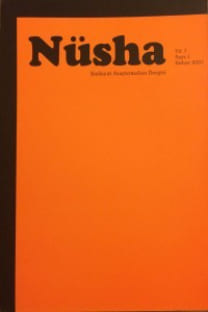TÜRKÇE VE ARAPÇA NEZAKET İFADELERİ: KARŞILAŞTIRMALI BİR İNCELEME
Turkish and Arabic Polite Expressions: A Comparative Review
___
- Abuarrah, S., Lochtman, K and Lutjerhams, M. (2013) Cross Cultural Pragmatics Requests' Use of Strategy and Level of Directness in Palestinian Arabic and British English. An-Najah Univ. Journal fo Research (Humanities), 27(5).
- Al-Ali, M. N. and Alawneh, R. (2010). Linguistic Mitigating Devices In American and Jordanian Undergraduate Students' Requests. Intercultural Pragmatics, 7(2), 311-339.
- Aldhulaee, M. T. (2011). Request Mitigating Devices in Australian English and Iraqi Arabic: A comparative study. A Research Paper. Deakin University School of Education Faculty of Arts and Education.
- Alfattah, M.H.A. and Ravindranath, B.K. (2009). Politeness Strategies in Yemeni Arabic Requests. Language in India Strength for Today and Bright Hope for Tomorrow, 9, 23-42.
- Al-Marrani, Y.M.A ve Sazalie, A.B. (2010). Polite Request Strategies by Male Speakers of Yemeni Arabic in Male-Male Interaction and Male-Female Interaction. The International Journal of Language Society andCulture, 30, 63-80.
- Aubed, M.M. (2012). Polite Requests in English and Arabic: A Comperative Study. Theory and Practice in Language Studies, 2(5), 916-922.
- Austin, J.L. (1962). How to do things with words. Oxford: Oxford University Press.
- Blum-Kulka, S. and Olshtain, E. (1984). Request and Apologies: A Cross-cultural Study of Speech Realization Patterns (CCSARP). Applied Linguistics. 5 (3). 196-213.
- Blum-Kulka, S., House, J. and Kasper, G. (1989). Cross Cultural Pragmatics. Requests and Apologies. Norwood, NJ: Alex.
- Brown, P. ve Levinson, S. (1987). Politeness: some universals in language usage. Cambridge: Cambridge University Press. Campsall, S. (2013). Glossary http://www.englishbiz.co.uk/grammar/main_files/definitionsn- z.htmadresinden 6 Mayıs 2013 tarihinde alınmıştır. Terms.
- Crystal, D. (2008). A Dictionary of Linguistics and Phonetics. (6.Baskı). Oxford: Blackwell Publishing Ltd.
- Demirezen, M. (1991). Pragmatics and Language Teaching. Hacettepe Üniversitesi Eğitim Fakültesi Dergisi, 6, 281-287.
- Dervişcemaloğlu, B. (2013) Pragmatik ve Söz Edimleri http://www.ege- edebiyat.org/modules.php?name=Downloads&d_op=getit&lid=56 ve adresinden 27 Nisan 2013 tarihinde alınmıştır.
- Dihhudâ, A. (1956/ h.1258-1334). Luğatnâme-yi Dihhudâ, 13. Cilt. Tahran: http://www.loghatnaameh.org/dehkhodaworddetail- 665e91a8c02f40b8932d20739eb30e6b-fa.html Aralık 2013 tarihinde alınmıştır. Tahran ve adresinden 10
- Goffman, E. (1967). Interaction ritual: essays on face-to-face behavior. Chicago: Aldine Pub. Co.
- Grice, P. (1975). Logic and conversation. In P. Cole, and J. Morgan (Eds.), Syntax and Semantics 3: Speech Acts (pp. 41-58).
- Hickey, L. ve Orta, I.V. (2013). Politeness As Deference: A Pragmatic View. http://rodin.uca.es/xmlui/bitstream/handle/10498/8733/18228392.p df?sequence=1adresinden 2 Mayıs 2013 tarihinde alınmıştır.
- Işık-Güler, H. (2008). Metapragmatics of (Im)politeness In Turkish: An Exploratory Emic Investigation, Yayımlanmamış Doktora Tezi, Orta Doğu Teknik Üniversitesi Eğitim Bilimleri Enstitüsü. Ankara.
- İbn Manzûr. (1993). Lisânu'l-'Arab.(3. Baskı, I. Cilt). Beyrut: Dâru İhya'i't-Turasi'l Arabî-Mu'essesetu't-Târîhi'l Arabî.
- Leech, G. (1983). The Principles of Pragmatics. London: Longman.
- Levinson, S.C. (1983). Pragmatics. Cambridge: Cambridge Univesity Press.
- Morris, C. H. (1938). Foundations of the Theory of Signs. In O. Neurath, R. Carnap and C. Morris (Eds.). In International Encyclopedia of United Science, 2:1, Chicago: The University of Chicago Press.
- Ogiermann, E. (2009). On Apologising in Negative and Positive Politeness Cultures. Amsterdam: John Benjamins Publishing Company.
- Ruhi, Ş. (2006). Politeness in Compliment Responses: A Perspective From http://elanguage.net/journals/index.php/pragmatics/article/downloa d/502/431.. adresinden 25 Nisan 2013 tarihinde alınmıştır. Turkish.
- Searle, J.R. (1979 [1975a]). A Taxonomy of Illocutionary Acts, in Searle (1979), 1-29 (originally published 1975).
- Tawalbeh, A. and Al-Oqaily, E. (2012). In-directness and Politeness in American and Arabic Requests: A Cross-Cultural Comparison. Asian Social Science. 8(10). 85-98.
- Thomas, J. (1995). Meaning in interaction: an introduction to pragmatics. London: Longman.
- Umar, A. (2004). Request Strategies as Used by Advanced Arab Learners of English as a Foreign Language. Umm Al-Qura University Journal of Educational & Social Sciences & Humanities, 16(1).
- Verschueren, J. (1999). Understanding Pragmatics. London: Arnold. Yule, G. (2010). The Study of Language. (Fourth Edition).
- Cambridge: Cambridge University Press.
- ISSN: 1303-0752
- Yayın Aralığı: 2
- Başlangıç: 2001
- Yayıncı: Oku A.Ş.
HAKÎM ŞİFAYÎ, BİR HİCVİYESİ VE KÂMÎ'NİN TÜRKÇE ŞERHİ
FAS KISA HİKAYE SANATININ DOĞUŞU VE GELİŞİMİ
TÜRKİYE'DEKİ ARAPÇA KÖKENLİ BAZI YER ADLARI
ARAP DİLİNDE LAHNİN NAHİV İLMİNİN ORTAYA ÇIKMASINDAKİ ROLÜ
TÜRKÇE VE ARAPÇA NEZAKET İFADELERİ: KARŞILAŞTIRMALI BİR İNCELEME
al-Nekat al-Balaghiyah FiAyat Marahil Takhaluk al-Janeen -Surata al-HajjWa al-Moa'monoon Anmothagan.
TÜRKİYE'DE ARAP DİLİ ALANINDA YAPILAN YÜKSEK LİSANS ve DOKTORA TEZLERİ - III
URDU EDEBİYATINDA İLERİCİ HAREKET: ŞAİRLERİN ÖZGÜRLÜK ÇAĞRISI
